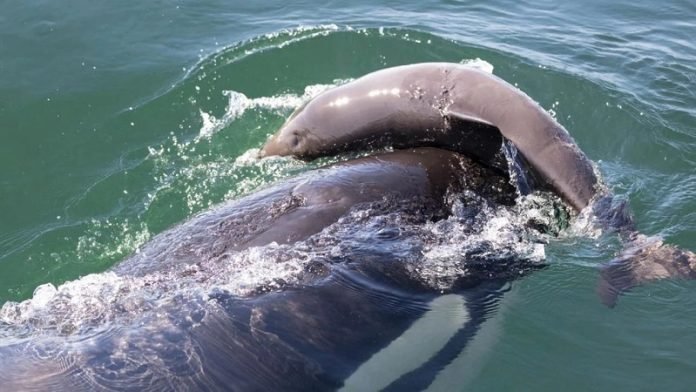
Killer whales, also known as orcas, are fascinating creatures known for their intelligence and complex social behaviors.
But, there’s a strange mystery about them that has puzzled scientists for decades.
Some killer whales in the Pacific Northwest have been seen bothering, and even hurting porpoises, but they don’t eat them!
A study published in Marine Mammal Science tried to solve this mystery. Researchers Deborah Giles of Wild Orca and Sarah Teman of the SeaDoc Society analyzed interactions between a group of killer whales known as the Southern Resident killer whales and porpoises in the Salish Sea, spanning over 60 years.
Southern Resident killer whales are in danger of disappearing with only 75 left!
They rely heavily on Chinook salmon, which are also endangered, for their survival. Without enough of these salmon, the killer whales are at risk.
People often wonder why these killer whales don’t just eat seals or porpoises. It turns out, fish-eating killer whales, like the Southern Residents, have different habits and preferences compared to those that eat marine mammals, even if they share the same waters.
The possible reasons
So, why do these killer whales mess with porpoises? The study offers three possible explanations:
Social Play: The killer whales might see porpoise harassment as a form of play to bond and communicate with each other. Just like humans play games, these intelligent creatures also engage in playful activities, which could help in improving their coordination and teamwork.
Hunting Practice: Harassing porpoises might be a way for killer whales to practice their hunting skills. They might use porpoises as moving targets to sharpen their skills, even if they don’t actually want to eat them.
Mismothering Behavior: This theory proposes that the killer whales might be trying to care for the porpoises, thinking they are weak or unwell. It’s like they are extending their natural caring behavior towards creatures outside their group. Some female killer whales have even been seen carrying porpoises, much like how they carry their own young.
These possibilities offer some explanations, but we might never know the exact reason why killer whales display this behavior. What we do know is that Southern Resident killer whales have a specialized diet focusing on salmon, so eating porpoises is off the menu for them!
This whole story underlines how crucial it is to have enough salmon in the Salish Sea. If we want the Southern Resident killer whales to survive, we need to ensure there are healthy salmon populations in the sea.
Interestingly, this study comes when another group of killer whales near Portugal and Spain are making news for playing around with boats!
These killer whales are different from the Southern Residents but seem to share a love for playful behavior.
Key Takeaways
Killer whales are amazing creatures with their own sets of rules and behaviors.
The Southern Resident killer whales and their interactions with porpoises reveal the complexity and richness of their culture and remind us of the importance of conserving their environment and food sources.
While the mystery behind their playful or puzzling behavior with porpoises remains unsolved, these findings offer a unique glance into the world of these magnificent marine mammals.
Follow us on Twitter for more articles about this topic.
Source: UC Davis.



